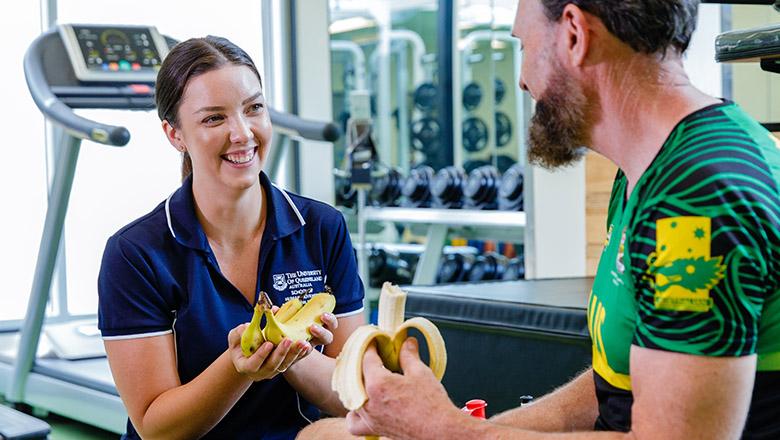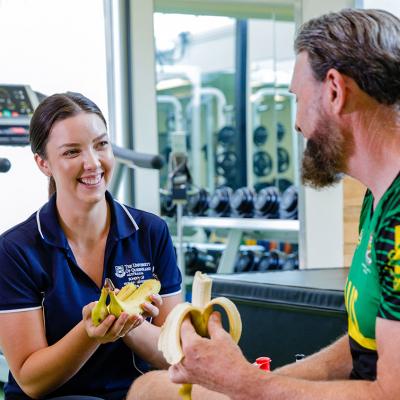Jobs in nutrition are rich and varied, with multiple options for fields of work. Olivia Wright, a Senior Lecturer in UQ's School of Human Movement and Nutrition Sciences, explores the many career opportunities in nutrition and dietetics.
With a qualification in nutrition or dietetics, you'll enter a profession that is constantly evolving. The expansion of the industry has meant that more novel areas of practice are created, and significant scientific research continues to inform new practice strategies.
Regardless of the area you choose, your main objective will always be to help people better their lives by empowering them to improve their own health through developing and maintaining healthier lifestyles. You could find yourself working in:
- clinical dietetics
- foodservice dietetics
- public health
- sports / exercise
- private practice
- mental health
- research
- academia
If you’re interested in pursuing dietetics or nutrition careers, keep reading to learn more about what kind of work you can expect to be doing in this exciting field.
Clinical dietetics
Clinical dietitians work in hospitals and other healthcare facilities, such as aged care. They are responsible for maintaining patients’ nutritional status and help to achieve a good quality of life through enjoying good food and mealtime experiences.
Some of the types of patients they help include those who are acutely ill and need to recover while in hospital. Dietitians also provide nutritional care for those who are in rehabilitation or longer-stay facilities.
Foodservice dietetics
Dietitians who work in foodservice may work in hospitals, aged care facilities and the food industry. They work with the foodservice system across all areas including:
- the design of menus
- food procurement
- food production
- food safety
- mealtime organisation
- development of environmentally sustainable waste management systems
- creating standardised recipes
- modification of existing meals to be more nutritious or fortified with added nutrients.
Public health
Dietitians have much to offer in public health. This could look like working with and for the community and with government and non-government organisations and leading international bodies (e.g. WHO, FAO).
Their work can involve advocating for food and nutrition policies that support chronic disease prevention. These could then be used to co-create health promotion messages with the public and inform strategies and programs to enhance the health of the broader population and specific population groups (e.g. children, Indigenous communities).
Sports / exercise
Dietitians with additional skills in sports / exercise science may also work as sports dietitians, providing advice to competitive sporting teams on food to maximise performance and recovery. In addition, they might provide advice to individuals for their own unique sports.

Private practice
Practising dietitians can specialise in particular areas, such as gut health. However, they could also provide advice across a range of conditions and work as a “generalist” practitioner.
Dietitians are often savvy business operators who can find their own niche area and set up private practices or other innovative businesses to help individuals or groups to improve their nutrition. They may specialise in specific aspects of dietary counselling or be experts at providing advice on new areas of practice, including nutrigenomics and the microbiome, for example.
They are also able to provide intensive workshops and demonstrations on:
- meal preparation to improve nutrient density
- healthy cooking strategies
- food safety and minimising food waste
- enhancing knowledge and skills regarding environmentally sustainable practices.
Mental health
Helping clients with mental health concerns is a growing field of dietetics as evidence builds in nutritional psychiatry. Nutrition plays a pivotal role in the health of our brains, and dietitians can help clients navigate complex issues surrounding eating habits when managing mental health concerns and related treatments.
Dietitians may work with individuals, providing one-on-one individualised counselling. It is not a “one size fits all” approach. Dietitians are trained in person-centred care and focus on getting to know individuals and design suites of strategies for people to customise their own treatment goals and plans.
Dietitians encourage clients to lead their care, take ownership of their goals and be in the driver’s seat for their journey to better health.
Academia
Dietitians can also become academics, focused on shaping the future profession in the latest evidence-based treatment and counselling techniques. They could:
- inspire new members of the profession to create change
- question realities
- continue to advocate for better nutrition and access to food for all.
Research
Dietitians may choose to focus on research and generating the scientific evidence to inform the practice, recommendations, and food and nutrition policies of the future. This can occur in a range of settings and may be based in universities, the food industry, community / public health organisations, research institutes or other research organisations. It also encompasses clinical research in healthcare facilities conducted by clinician-researchers.
This is an exciting and rewarding area, underpinned by additional training such as a master's degree or doctorate.
Ready to begin or advance your career in nutrition and dietetics? Explore UQ's Bachelor of Human Movement and Nutrition Sciences or Master of Dietetics Studies.
Looking for other careers in health and behavioural sciences? Explore your career options.







